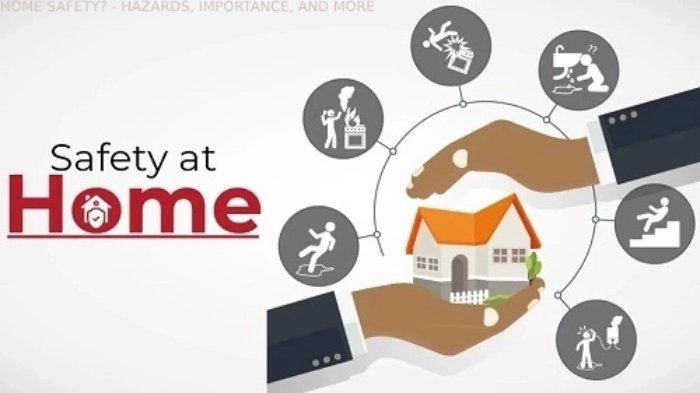How does home safety work?
home safety discusses about home security. We’re talking about general hazard knowledge, hazard communication, and possible risks these risks pose within and outside the house. Even those who live in or close to the physical building are susceptible to these risks, which can result in physical harm, harm, or even death.
It addresses the detection, evaluation, mitigation, and prevention of unwelcome risks using acknowledged standards of practice, research, and application.
The Significance of home safety
Security in general and the Significance of home security go hand in hand. You may avoid ordinary mishaps like falls and be safeguarded against emergencies like fires by keeping your house secure and free of risks. To secure your safety and the safety of your loved ones, develop excellent practices at home.
Hazards
The following are dangers that exist at home:
Falls:
The most common reason for fatal incidents at home is falls—the cause of one-third of all fatalities. The most vulnerable to this kind of catastrophe are older people.
Fire:
For you and the people you live with, and for us, a home fire may be deadly. Ensure your home has working smoke detectors and a fire prevention plan, including safety procedures.
Poisoning:
Numerous home materials, including cleaning and personal care supplies, medications, and petrol, pose a risk. Accidental ingestion is less likely if these products are kept closed and out of kids’ reach. Additionally, avoid putting chemicals or petrol in bottles that may be mistaken for consumables, like soda bottles, while storing these items.
Carbon Monoxide
Carbon monoxide is an invisible rogue. It cannot discriminate between odors, unlike gas.
Choking:
Young children who often put tiny things in their mouths risk choking.
Sharp Things:
We all have several necessary sharp things about the house, but they can fatally injure tiny children.
Allergy:
Mold directly results from water condensation on surfaces like walls and window frames and is correlated with indoor humidity. Sneezing, itchy eyes, and headaches are signs of a mold allergy.
Slippery Elements:
Everyday activities can create slippery surfaces, resulting in accidents and injuries.
Fuel Leak:
Because most fireplaces use gas, there is a chance that gas will leak, which might result in an explosion.
Standard Home Safety Advice
1.Keep a smoke sensor and fire extinguisher on each floor to start.
2.Use extreme caution when smoking. Never smoke in bed or alone.
3.On the floor, avoid applying slick wax.
4.Ensure the bath mat has a non-slip bottom to prevent slipping in the bathtub.
5.To prevent burning, turn on the water heater when the temperature is 120 degrees or lower.
6.Keep any medications out of children’s reach.
7.All of the pharmaceutical bottles’ tops should be on.
8.Do not discuss the presence of needles in the home, and keep hands hidden behind closed doors.
9.Never let the sun touch your medications. (This warning also pertains to injectables like insulin.)
10.Cold and hot water faucets should be marked.
11.Make use of reversible door locks.
12.Immediately clean up spills.
13.Never climb up chairs or staircases.
14.All stairways inside and outside the home should have a solid handrail. You may even get a stairlift if necessary.
15.Use only glare-free incandescent lights of 100W or larger (or equivalent fluorescent lamps).
16.After lying down or sitting, always stand slowly. Make sure you have stability by taking your time.
17.Low heels on dress shoes are appropriate.
18.Use the appropriate walking aids as needed.
19.Take out any floor-mounted phone or electrical cords.
20.Make sure that all staircases have switches for both up and down lighting.
21.A non-slip surface is required on stair steps.
22.Use suggested bath products and firmly fasten them to the toilet, tub, and shower walls.
23.Shower only while there is service.
24.Maintain a clean and organized floor.
25.The illumination of workspaces.
26.Mark the ON and OFF positions of gadgets very, very clearly.
27.Knives should be put away on a shelf.
28.Use a kettle that shuts off automatically.
29.Keep bulkier objects close to your waist.
30.Separate harmful objects from food.
31.When using a stove, avoid wearing long, baggy clothes.
32.Make careful to swap items often—the times of termination.
33.Cover electrical outlets to stop kids from sticking things in them.
34.Examine the wear on electrical wires. Use only cables that are not frayed or have bare wires. Make sure you check the plugs and the cable’s connection.
35.Ground all plug adapters with three prongs.
36.Before using, inspect heating pads for cracks. If it’s accessible, don’t utilize it.
37.Regularly check your prescriptions with your doctor or chemist, and create new meds.
38.Verify that prescription labels are legible.
39.Make sure you have the proper medication by carefully reading the label, and make sure you are always taking the recommended dosage.
40.Discard any outdated or used medicines.
41.Has medicine been given out in a handy dispenser or bubble pack?
Alos read:- The Complete Manual of Data Analytics for Novices
